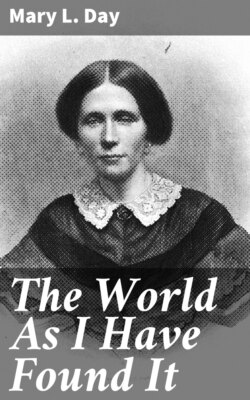Читать книгу The World As I Have Found It - Mary L. Day - Страница 4
CHAPTER I.
Оглавление"Warriors and statesmen have their meed of praise,
And what they do, or suffer, men record;
While the long sacrifice of woman's days
Passes without a thought, without a word:
And many a holy struggle for the sake
Of duty, sternly, faithfully fulfil'd; For which the anxious soul must watch and wait, Goes by unheeded as the summer wind, And leaves no memory, and no trace behind! Yet, it may be, more lofty courage dwells In one meek heart that braves an adverse fate, Than his whose ardent soul indignant swells, Warmed by the fight, or cheered through high debate. The soldier dies surrounded; could he live Alone to suffer, and alone to strive?"
So was rendered the sad soul-music of one of the legion,
"Who learned in sorrow
What they taught in song."
and the weird words have been echoed by the voice of many a woman all along, whose weary wanderings have burned the sacrificial fires; amid the ashes of whose dead hopes the embers have flickered and faded only to rekindle the lurid, lustrous light of added, and still added offerings. There, waiting and watching the deep tracery "upon the sands beside the sounding sea," find wave after wave wash away the mystic hand-writing.
The ebbing tide carries afar the ships freighted with aching, anguished hearts; when borne upon the swell of the flowing sea, come the swift sails of Argosies richly laden with hope, full with fruition.
Within the heart of all there lies deeply imbedded the "Black Drop" of which the Mahometan legend tells, and which the angel revealed to the Prophet of Allah. 'Tis in aching anguish this drop must be probed and purified, to be healed only through the endless eloquence of duty done.
The sightless eyes have vivid visions. Theirs is the light in darkness which stirred the soul of a Milton with a "gift divine;" inspired a Homer with the "fire and frenzy" which crowned an Iliad and an Odyssey, the master pieces of Epic verse; gave to the antique and traditional literature of the Celtic race its meteoric brilliancy, and produced the weird, wondrous sublimity of an Ossian.
All who have read the Invocation to Light by the blind authoress, Mrs. De Kroyft, must have realized the luminous light of a soul sublimated by sorrow and swelling and soaring in eloquent strains.
'Tis but a simple song I must sing, a bird-note amid cathedral tones; but may not its minstrelsy meet the heart and search the soul of many a sorrowing one, or rise like the song of the nightingale to the throne of Him who sees the lives enthralled?
If this little lesson of life can find a single searcher for the truth it tells, or bear on the breath of the breeze "one soft Æolian strain," may I not hope that it may help to swell the harp-notes of the heavenly harmonies?
